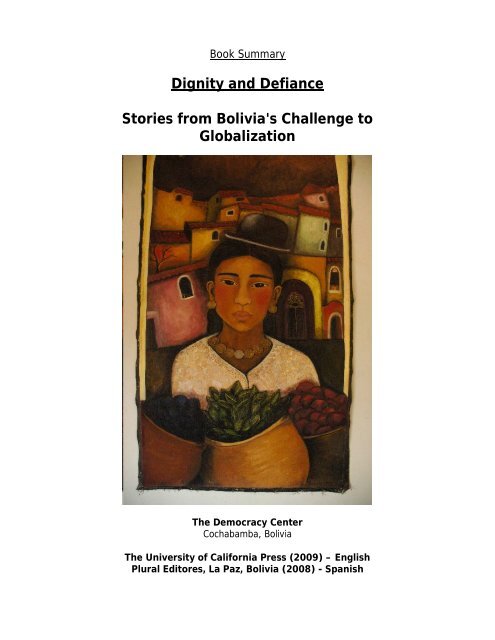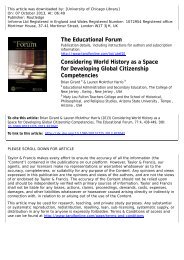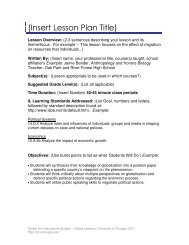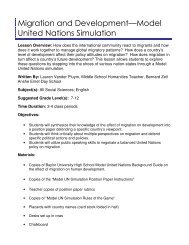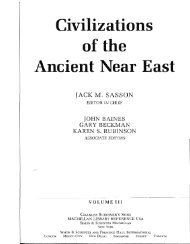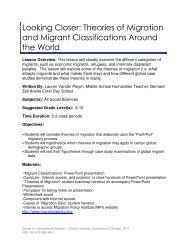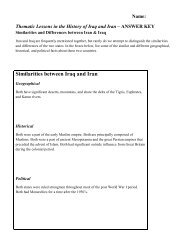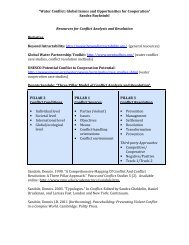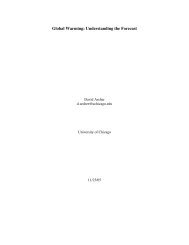Book Summary (PDF) - Center for International Studies
Book Summary (PDF) - Center for International Studies
Book Summary (PDF) - Center for International Studies
You also want an ePaper? Increase the reach of your titles
YUMPU automatically turns print PDFs into web optimized ePapers that Google loves.
IntroductionThe world's attention has turned once again to Latin America.A region viewed too often as the United States's "backyard," is in the midst of apowerful political and social trans<strong>for</strong>mation. Countries that fought to move fromdictatorship to democracy in the 1980s, and that were converted intolaboratories <strong>for</strong> "free market" economic re<strong>for</strong>ms in the 1990s, have shiftedpolitical course, dramatically, once again. No nation is more emblematic of thatchange than Bolivia.Over the course of just seven short years, South America's most impoverishedand most indigenous nation has become synonymous with political change fromthe grassroots upwards – from its now-famous water revolt against the BechtelCorporation in 2000, to the inauguration of its first indigenous President, EvoMorales, in 2006. At the heart of this trans<strong>for</strong>mation is Bolivia’s historicchallenge to the <strong>for</strong>ces of globalization.For two decades Bolivia has been Latin America's chief testing ground <strong>for</strong> anexperiment in pro-market economic re<strong>for</strong>ms driven by Washington andinternational financial institutions such as The World Bank and The <strong>International</strong>Monetary Fund. Bolivia privatized its most important resources and industries(its water, gas and oil, railroads and more) and it adopted economic austerityprograms, all policies crafted a hemisphere away. When those re<strong>for</strong>ms failed todeliver the prosperity that was promised, the people rebelled, demanding afuture of their own design.The story of Bolivia’s challenge to globalization is about a people demandingbasic dignity. Sometimes that challenge is about popular rebellion anddemocracy carried to the streets. Other times it is about individuals makingdifficult choices <strong>for</strong> how to deal with a globalizing world. But overall it is apowerful cautionary tale about the economic theories developed in wealthynations and what those theories really mean when they become practice inimpoverished ones. In short, Bolivia is challenging the world to makeglobalization something other than a set of economic orders from the north. It isabout a people calling <strong>for</strong> global integration to be something different than it hasbeen, something more fair and more just.Dignity and Defiance offers a close-up look at Bolivia's historic trans<strong>for</strong>mation ina way readers will get nowhere else. It weaves together stories of regularpeople striving to make their lives better along with vivid accounts of the politicalstruggles that have made Bolivia international front-page news. It also tellsthose stories against the striking backdrop of the country's rich cultures, stunninggeography, and diverse people, in a way that will leave readers with deep andlasting images.2
In its pages readers will meet the elderly woman whose life herding llamas isthreatened by an Enron/Shell oil spill; the <strong>for</strong>mer housekeeper who became thenation's Minister of Justice; the young people who stood down a <strong>for</strong>mer dictatorto take back control of their water; and many others whose lives reflect theturbulent recent events of a nation that has captured world attention.Dignity and Defiance offers a powerful mix of story telling and analysis by acollection of writers who have made Bolivia their home and who have workedclosely with Bolivian colleagues to get the story right. Bolivia's recent history,like Latin America's and the world's, is about people demanding justice and selfdeterminationin a world of new global <strong>for</strong>ces. By looking up close at what thismeans <strong>for</strong> one nation, readers will have an opportunity to deepen their grasp ofissues and trends that are universal and that are likely to shape all our lives <strong>for</strong>decades more to come.Eight StoriesDignity and Defiance is comprised of eight chapters (averaging 25-30 pages),each one the story of an event, an issue, or a group of people that embodies theessence of Bolivia's struggle to maintain its independence and integrity as thenation deals with economic and political <strong>for</strong>ces from abroad.1. The Cochabamba Water Revolt and Its AftermathIn the opening months of 2000 the people of Cochabamba faced down WorldBank doctrine, armed <strong>for</strong>ces dispatched by a <strong>for</strong>mer dictator, and one of thelargest corporations in the world (Bechtel), to take back control of their water.In the years since, the Cochabamba Water Revolt has become a global symbol --a modern Andean version of David and Goliath. Jim Shultz, who was the onlyongoing source of <strong>for</strong>eign reporting from the streets in the midst of the protests– coverage that was the catalyst <strong>for</strong> subsequent reporting by The New Yorker,PBS, and others – looks back at the water war as few others can. What led to arevolt over water? What really happened on the street? And perhaps mostimportant, what has the water revolt meant since – to the global debate overwater, the trans<strong>for</strong>mation of Bolivian politics, and to the struggle <strong>for</strong> clean andaf<strong>for</strong>dable water in Cochabamba.2. A River Turns Black: Enron and Shell Spread Destruction across Bolivia’sHighlandsBolivia's vast highlands are home to indigenous peoples that trace their roots andtheir culture back be<strong>for</strong>e the time of the Incas. Crossing those lands at the startof the new century was the long snake of a steel pipeline, operated by asubsidiary of two <strong>for</strong>eign oil giants, Enron and Shell. In January 2000, afterrepeated warnings to the corporation that its pipeline was about to burst, the3
at how free trade agreements are becoming the new tool through which <strong>for</strong>eigngovernments hope to maintain heavy influence over Bolivia's economic path.6. Coca: The Leaf at the <strong>Center</strong> of the War on DrugsIn his historic appearance be<strong>for</strong>e the UN General Assembly, in September 2006,President Evo Morales stood be<strong>for</strong>e world leaders, held aloft a small coca leafand declared, "This is the green coca leaf, it is not white like cocaine. Itrepresents Andean culture." That leaf has been at the center of a U.S.-backeddrug war that has put thousands of Bolivians in jail and <strong>for</strong>ced crop eradicationsthat helped push the national economy into crisis <strong>for</strong> a decade. A collection ofauthors offers a series of essays that look at: the culture and history of coca; abrief history of the U.S. war on drugs in Bolivia; stories from los cocaleros (aBolivian term that refers to those who cultivate the coca plant), the families whohave experienced this “war” on their doorstep; the tale of a Bolivian mother offive who was sent to jail to boost U.S. drug war statistics; and a look at theviable alternatives <strong>for</strong> farmers growing coca and the potential <strong>for</strong> Bolivia toredefine its policies to be anti-drug but also pro-coca.7. Workers, Leaders, and Mothers: Bolivian Women in a Globalizing WorldThe wave of globalization brings both challenges and opportunities to the lives ofBolivian women. Melissa Draper bases her analysis on the stories of six womenwhose lives have been shaped--albeit in distinct ways-- by global <strong>for</strong>ces. Sheweaves together stories of mothers, fighters and workers examining a series ofdynamics, including: how women have been impacted disproportionately byharsh policies from abroad; what it means <strong>for</strong> them to have access to <strong>for</strong>eignmarkets <strong>for</strong> their traditional indigenous wares; how some have built leadershipwith support from a globalized civil society; and how some benefit so directlyfrom those globalizing <strong>for</strong>ces that they begrudge those who present anyresistance to it. Melissa draws on three years of personal experience workingwith women’s labor unions, social movement leaders, and professional women inBolivia, bringing their stories to life with thoughtful analysis.8. And Those Who Left: Portraits of a Bolivian ExodusIn 2006, each week nearly five hundred Bolivians board buses and planes toleave their families and seek opportunity and employment abroad. Nearly a fifthof the nation's population now lives outside of Bolivia. Mothers leave theirchildren, fathers leave behind their families – to seek out some slice ofopportunity in a world where, <strong>for</strong> many, leaving seems the best real option.Based on interviews with Bolivian immigrants in Washington DC, Buenos Aires,and Barcelona, and with families in Bolivia, Lily Whitesell traces the stories ofthose who have left. Why did they leave? What were their dreams? What hasbecome of their lives in their new nations? Do they plan to return to Bolivia and5
why? In Bolivia's emigration story we learn the universal story of those wholeave.These chapters are complemented with an introduction from the editors, settingout the themes of the book and each of these varied issues in a commoncontext. Finally, there is a substantial conclusion section that draws the lessonsfrom the stories together in a clear and original analysis.The Editors and ContributorsTo produce Dignity and Defiance, an able group of <strong>for</strong>eign writers who maketheir home in Bolivia joined <strong>for</strong>ces with a team of Bolivian colleagues, to build aunique bridge between the Bolivian experience and readers in the United Statesand abroad. While the <strong>for</strong>eigners did the writing, the Bolivians collaborated atevery step with ideas, input, and guidance that makes the book theirs as well.The result is insightful reporting and story telling that goes well beyond theexisting <strong>for</strong>eign writing about the indigenous nation in South America'sgeographic heart.EditorsJim Shultz, Editor, is the Democracy <strong>Center</strong>’s executive director. A graduate ofthe University of Cali<strong>for</strong>nia at Berkeley and Harvard University, he is the authorof two books, most recently the award-winning Democracy Owners’ Manual(Rutgers University Press, 2002). His writings on global issues have beenpublished in magazines and newspapers across the United States, Canada, andthe United Kingdom. His on-the-ground reporting on the 2000 CochabambaWater Revolt won top honors from Project Censored. Jim has lived in Bolivia <strong>for</strong>ten years.Melissa Draper, Editor, earned her Masters in <strong>International</strong> Relations at JohnsHopkins University (School of Advanced <strong>International</strong> <strong>Studies</strong>) with aconcentration in women’s issues in development. A graduate of DartmouthCollege, she worked <strong>for</strong> two years with women in grassroots organizations inBolivia and also in rural Maharashtra, India. She returned to Bolivia in 2005 asan Earhart Fellow to work on issues of women and globalization in coordinationwith The Democracy <strong>Center</strong>. Melissa has lived in Bolivia <strong>for</strong> almost five years.Thirteen authors, researchers, and analysts –a combined team from the US andBolivia--worked with the editors to create this book.The Special Attention Paid to the Quality of the WritingDignity and Defiance is the product of a good deal more than research and6
Internet. The source was an electronic newsletter with thousands ofreaders — written by the American who had uncovered the Bechtelconnection — Jim Shultz [The <strong>Center</strong>’s executive director]. He was in thestreets during the uprising, and filing daily accounts about events inCochabamba.The <strong>Center</strong> also has a well-established record in book publication. Our mostrecent publication, The Democracy Owners' Manual (Rutgers University Press,2002) had three printings, selling more than 5,000 copies. It was also named asone of the top academic press titles of the year by Choice Magazine (the journalof academic libraries) and won the Myers Outstanding <strong>Book</strong> Award <strong>for</strong> humanrights writing in 2003. The Owners' Manual is also now used as a text in avariety of universities across the United States.Because of its connection to two important topics in the news – political changein Latin America and globalization – and because it is written <strong>for</strong> a much broaderand more general audience, we have no doubt that Dignity and Defiance will farsurpass the per<strong>for</strong>mance of our previous publications. We believe it will be abook that will draw a large readership and serve to educate and inspire readersin the U.S. about the important social and political trans<strong>for</strong>mation happeningamong their neighbors to the south.8


